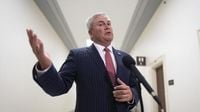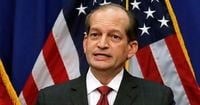On Capitol Hill, the search for answers in the Jeffrey Epstein saga has taken a dramatic new turn, as the House Oversight Committee intensifies its bipartisan investigation into the late financier’s connections and the federal government’s handling of his notorious sex trafficking case. With a series of subpoenas, high-profile interviews, and renewed calls for transparency, lawmakers from both parties are pressing for a full accounting of who may have been involved with Epstein—and why the government’s response to his crimes has left so many questions unanswered.
On Monday, August 25, 2025, the committee, led by Chairman James Comer, issued a sweeping subpoena to the estate of Jeffrey Epstein. The demand: unredacted documents and communications, including the much-discussed “birthday book” compiled for Epstein’s 50th birthday in 2003, as well as banking records, flight logs, calendars, and other materials spanning nearly three decades. According to ABC News, the committee’s request covers records from January 1, 1990, through August 10, 2019, with a deadline for delivery set for September 8, 2025.
“It is our understanding that the Estate of Jeffrey Epstein is in custody and control of documents that may further the Committee’s investigation and legislative goals. Further, it is our understanding the Estate is ready and willing to provide these documents to the Committee pursuant to a subpoena,” Comer stated, emphasizing the urgency and scope of the probe.
The “birthday book” itself has become a flashpoint. The Wall Street Journal reported that the book contains a “bawdy” letter from then-private citizen Donald Trump, a claim Trump has vehemently denied. In response, Trump filed a $10 billion defamation lawsuit against the Wall Street Journal, as noted by ABC News. Dow Jones, the newspaper’s parent company, stood by its reporting, declaring, “We have full confidence in the rigor and accuracy of our reporting and will vigorously defend against any lawsuit.”
Ghislaine Maxwell, Epstein’s longtime associate and now a convicted sex trafficker serving a 20-year sentence, told Deputy Attorney General Todd Blanche during a recent interview that she coordinated contributions to the birthday book at Epstein’s request. However, she could not recall if Trump was among those who responded. Maxwell, who continues to profess her innocence, was convicted in 2021 for her role in recruiting and grooming underage girls for Epstein, sometimes as young as 14, according to federal prosecutors cited by ABC News.
The committee’s investigation has also turned a spotlight on the federal government’s own conduct. Comer has made clear that the panel is “reviewing potential mismanagement of the federal government’s investigation of Mr. Jeffrey Epstein and Ms. Ghislaine Maxwell,” a point echoed by the Associated Press. The subpoena to the estate is just one piece of a broader inquiry that includes scrutiny of the Justice Department’s actions and the circumstances surrounding Epstein’s death in a New York jail cell in 2019—a death officially ruled a suicide but still the subject of widespread conspiracy theories and public skepticism.
Pressure for transparency has come from both sides of the aisle. Democrats on the committee, led by Rep. Robert Garcia, have expressed frustration with the Justice Department’s disclosures to date. “DOJ’s limited disclosure raises more questions than answers and makes clear that the White House is not interested in justice for the victims or the truth,” Garcia said in a statement, referencing the 33,000 pages of documents received—most of which were already public, according to the Associated Press.
In response, a bipartisan group of House members is preparing to push legislation that would require the Justice Department to release a full accounting of the Epstein investigation. As Congress prepares to return to Washington, the push for more information is expected to intensify.
Meanwhile, the committee’s witness list has expanded. On Tuesday, August 26, 2025, former Attorney General Alberto Gonzales testified in a closed-door session. Gonzales, who led the Department of Justice from 2005 until mid-September 2007, was involved in early discussions about Epstein’s infamous 2008 non-prosecution agreement—a deal that allowed Epstein to plead guilty to state charges involving a single underage victim and serve just 13 months in a Palm Beach County jail, much of it on work release. Comer noted in a subpoena cover letter that the agreement was signed just one week after Gonzales left office, as reported by Fox News.
Other top officials have also been drawn into the probe. The committee has issued subpoenas for former FBI directors Robert Mueller and James Comey, former Attorneys General Bill Barr and Jeff Sessions, as well as former President Bill Clinton and former Secretary of State Hillary Clinton, among others. Notably, Alex Acosta—the former U.S. attorney who approved Epstein’s non-prosecution agreement and later served as Trump’s Labor Secretary—was initially excluded from the list, prompting criticism from attorneys for Epstein’s victims and Democrats on the committee. NBC News reported that, after “weeks of pressure,” Acosta agreed to appear for a voluntary transcribed interview scheduled for September 19, 2025.
The Justice Department’s own review, completed in 2020, found that Acosta “made the pivotal decision to resolve the federal investigation of Epstein through a state-based plea and either developed or approved the terms of the initial offer to the defense that set the beginning point for the subsequent negotiations that led” to the non-prosecution agreement. The report also determined that Acosta’s deputies bypassed the FBI and the victims themselves in making the deal, which protected Epstein from federal prosecution and granted immunity to his named and unnamed co-conspirators.
Acosta’s role has been the subject of renewed scrutiny, especially after he resigned as Labor Secretary in 2019 amid mounting criticism. According to NBC News, the committee’s about-face in inviting Acosta was seen by many as a necessary step for any “genuine investigation into the federal government’s sweetheart deal with Epstein,” as victim attorney Jack Scarola put it.
The investigation, however, has not been without political friction. Democrats have accused Republicans of failing to ask sufficiently probing questions during depositions, while Republicans have implored their colleagues not to politicize what began as a bipartisan effort. The Associated Press noted that unity quickly unraveled after former Attorney General Barr’s deposition, with Democrats claiming he did not clear Trump of wrongdoing in the Epstein case—a contention Republicans dispute.
Adding to the complexity, the Justice Department and FBI announced in a joint memo this summer that Epstein’s death was a suicide, that no further charges were expected, and that no additional information would be released. This move outraged many Trump supporters, who have long called for more transparency and have promoted conspiracy theories about Epstein’s death.
As the House Oversight Committee continues to subpoena documents—including a demand for “all entries contained within the reported leather-bound book compiled by Ms. Ghislaine Maxwell for Mr. Jeffrey Epstein’s 50th birthday”—and schedules testimony from key figures, the quest for answers remains fraught but undeterred. Brad Edwards, an attorney representing more than 200 of Epstein’s victims, told ABC News, “Jeffrey Epstein is dead, so, after making all redactions for victim identifying information, the estate can easily turn over all the documents requested without objection or delay. And, because of previous litigation, the vast majority of redactions should have already been made.”
With subpoenas flying, testimony mounting, and political tensions simmering, the investigation into Jeffrey Epstein’s web of connections and the government’s handling of his crimes is far from over. Lawmakers—and the public—continue to demand the full story, hoping that this time, the truth will finally come to light.



